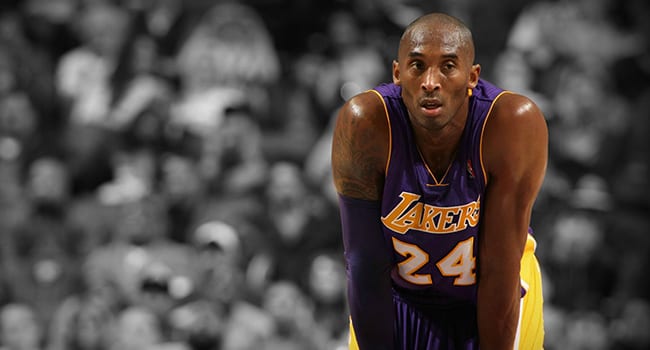 I was walking off the tennis court last Sunday when I saw several texts saying Kobe Bryant had been killed in a helicopter crash.
I was walking off the tennis court last Sunday when I saw several texts saying Kobe Bryant had been killed in a helicopter crash.
My first reaction was disbelief, then shock, then sadness.
As I got in my car, I wasn’t sure why I was so sad. While I definitely respected his athletic ability and amazing competitive drive, I was never a Bryant fan. I guess the sadness came because it seemed so unfair that a guy who was only 41 and still making positive contributions to society had died so instantly.
When I got home, I heard that his 13-year-old basketball-loving daughter had been killed in the crash as well. My heart sank. Here was a girl who had her whole life in front of her.
I watched a clip of Kobe talking to his daughter at a basketball game. It was very poignant and as the dad of two basketball-playing daughters with whom I have shared similar moments, it really hit home.
The news continued to worsen. Eventually, we learned nine people lost their lives in the accident. That meant several families had to deal with the hardest news that anyone can ever hear: the unexpected, tragic death of a loved one. My heart sank further.
Gradually, we started learning more about the other victims. First, it was another 13-year-old girl, a teammate of Kobe’s daughter, along with her mom and dad, a legendary college baseball coach.
A young female assistant basketball coach was also killed. She was a mother to children ages eleven, nine and three.
Then we learned about another 13-year-old basketball player on board, along with her mother.
And, of course, the pilot.
So sad, so tragic for everyone involved.
But Kobe Bryant was naturally the focus of the news stories and tributes. He was a basketball superstar, one of the greatest players ever. We’ve seen him on our screens for more than 20 years. He played in numerous National Basketball Association playoff games and won championships with the Los Angeles Lakers. He appeared in hundreds of commercials and interviews. He won an Oscar for a short film.
In the past year alone, we saw Bryant coaching his daughters, attending basketball games and enjoying the U.S. Open tennis tournament. His image had become so familiar we almost felt we knew him. That’s part of the reason the news of his death rocked people in not only the United States but also around the world. Basketball is a global sport and Bryant was a global icon.
As I sat numb watching the coverage on ESPN, my emotions were about to take another twist. A piece about his legal troubles in Eagle, Colo., started playing.
This was the ugly part of his legacy. In July 2003, Bryant, 24, was arrested following a sexual assault complaint from a 19-year-old woman, an employee of the hotel where Bryant was staying. At the time, Bryant had been married a little over two years to his wife Vanessa.
The pain I was feeling for Bryant, his family and the others involved in the crash had now expanded to include pain for the woman involved in the Colorado hotel incident.
The young woman alleges Bryant forced her to have sex with him in his room after she gave him a tour of the hotel. She also said Bryant repeatedly choked her. Details of the transcripts and records of the case are disturbing. After several months of non-stop media coverage leading to a trial, the woman involved decided to not testify and the criminal charges against Bryant were dropped. Bryant settled with the woman in a civil case.
We’ll never know exactly what happened that night. Bryant didn’t admit guilt but he did issue an apology.
“Although I truly believe this encounter between us was consensual, I recognize now that she did not and does not view this incident the same way I did,” wrote Bryant in a letter. “After months of reviewing discovery, listening to her attorney, and even her testimony in person, I now understand how she feels that she did not consent to this encounter.”
Like it or not, that incident is part of Bryant’s legacy. But it doesn’t complete it.
In the 16 years following that case, Bryant became a devoted family man, an advocate for women athletes, a supporter of the WNBA, a promoter of the arts, a successful businessman and a basketball coach and trainer for athletes from elementary school to the pro ranks through his academy.
It appears that at the time of his death, Bryant had become a model husband, father, citizen and businessman.
Nevertheless, Bryant left us with a complicated legacy to reflect upon.
There’s plenty to read about Bryant’s accomplishments. But, as Joan Niesen wrote in The Guardian: “You won’t read as much about 2003. … Bryant got a second chance. He used it to play his way into the conversation as one of basketball’s all-time greats. There was never another criminal accusation directed at the superstar. He was a family man, a businessman, a man who sat on Jimmy Kimmel’s couch and told the world with a look of satisfaction that his daughter would carry on his basketball legacy.”
Could he have done more?
Probably. For one thing, he could have made a regular practise of speaking to young males about the importance of treating women with respect.
That said, I’m glad Kobe Bryant evolved into the man he was by the time of his death. He looked totally at peace, a man dedicated to loving and serving others. He was positively impacting the world and his future looked bright.
I won’t forget the incident in Colorado. But I will focus more on the person Bryant had become when his journey on Earth had finished.
Ken Reed is sports policy director for League of Fans (leagueoffans.org), a sports reform project. He is the author of The Sports Reformers, Ego vs. Soul in Sports, and How We Can Save Sports.
![]() The views, opinions and positions expressed by columnists and contributors are the author’s alone. They do not inherently or expressly reflect the views, opinions and/or positions of our publication.
The views, opinions and positions expressed by columnists and contributors are the author’s alone. They do not inherently or expressly reflect the views, opinions and/or positions of our publication.


